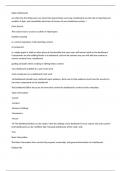Exam (elaborations)
Epic Training COG170 Cogito Fundamentals
- Course
- Institution
The user and content share at least one report group Radar dashboards are often the first thing users see when they log into Epic every day. Dashboards are the hub of reporting and analytics in Epic, and consolidate data from all corners of your healthcare system. I Chart Search. The easiest wa...
[Show more]



